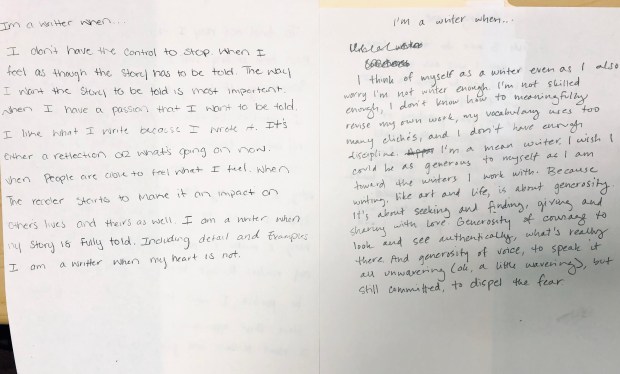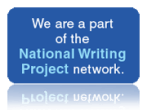“I’m A Writer When . . .”
Most of the students I work with who come to writing centers begin their tutoring the same way: “I’m not a writer,” they vow. Or a confession–”I’m really bad at writing.” And then the combination: “I’m a bad writer.” These admissions come from voices within or outside voices that persistently tell them who they are and aren’t and what they’re capable of. As writing partners together, I want us to escape these binds. I want us to learn how we can grow and discover through writing almost immediately. So, we free-write in our tutoring sessions from the first day.
I learned about using the stem, “I’m A Writer When” from Dr. Hannah Ashley when I participated in Writing Zones, a college access program for high school writers. We hosted students on the West Chester University campus, honoring the writers they were and introducing them to writing opportunities they would encounter in college. When asked to complete the phrase, “I’m a writer when …” students said, “When I’m sending a text message, when I’m writing a list, when I’m using a hashtag.”
Acknowledging the writers we already are dispels the notion that “writer” is a far-away identity, for some unattainable. We’re taking a strengths-based approach to respect the diverse foundations of literacy we each draw from. At the Penn State Brandywine Writing Studio, we introduce the “I’m a Writer When” prompt as a free-writing activity on the first day. Students take five minutes to write as many ideas or stories that come to mind to extend the statement.
Some students record all the ways they write–for what occasion, for whom, something about the rewards and challenges about their writing. Others dip into specific moments in their writing histories and write about a time when writing got them through hardship, or how writing is elusive. And some writers write about their dispositions, what compels them to record words and thoughts on the page or what frustrates them from doing so. Importantly, they are all writing. I write alongside students every time. I have easily written fifty pages of “I’m a Writer When.” I’m struck by what shows up frequently and what new observations I record in this iterative process. It’s important that students and I share this activity, especially at the beginning of our relationship. We’re building trust and visibility with one another.
 Jasmin is a writer this year who immediately drew on her strengths to tell her experience of writing: “I’m a writer when I feel as though the story has to be told. The way I want the story to be told is most important.” She took the opportunity to look at herself and introduce herself to me. I’m also struck by the hopefulness in our work side by side, how we’re both searching to move and connect with others and ourselves in our writing.
Jasmin is a writer this year who immediately drew on her strengths to tell her experience of writing: “I’m a writer when I feel as though the story has to be told. The way I want the story to be told is most important.” She took the opportunity to look at herself and introduce herself to me. I’m also struck by the hopefulness in our work side by side, how we’re both searching to move and connect with others and ourselves in our writing.
“For someone with so much rhetorical power,” I later asked Jasmin, “Do you call yourself a writer?”
“Not really,” she answered, “I don’t really write.”
I learned that free-writing, and sitting down in general to examine her perceptions on the page, was an activity almost unique to our relationship, but one she is now eager to do every week. We both are.
At the end of the five minutes, we consider our work; I try for us to celebrate it, too. This is easier to do with some than others, especially for those writers who insist they are not writers. It seems important to respect the ways someone identifies, even if it is a negative self-perception. However, I do make a point to notice what they’ve written, how they’ve written it. I will ask follow-up questions. I do look for intersections in theme or appearance about our writing.
I’m interested in revisiting this activity at the end of the semester. I’d like to see what students think of their writing lives after their first semester of college, after frequently free-writing, and after forging a collaborative writing relationship. I’d like to see what I think about it, too. I wonder how our pages will talk to one another again, side by side.
-Liz Mathews




Thanks, Liz. I loved both the content and craft of this post. The last line read like poetry.
LikeLike
I’m a writer when…
I have something I can’t stop thinking about
I keep in touch with family and friends
I catalog milestones in my daughter’s life
I model a writerly life for my students
I write notes of encouragement, praise, thanks, congratulations, condolences…
I reflect on my pedagogy
I comment on thought-provoking blog posts
Thanks Liz – I found thinking about this really uplifting and am excited to see how my students reflect!
LikeLike